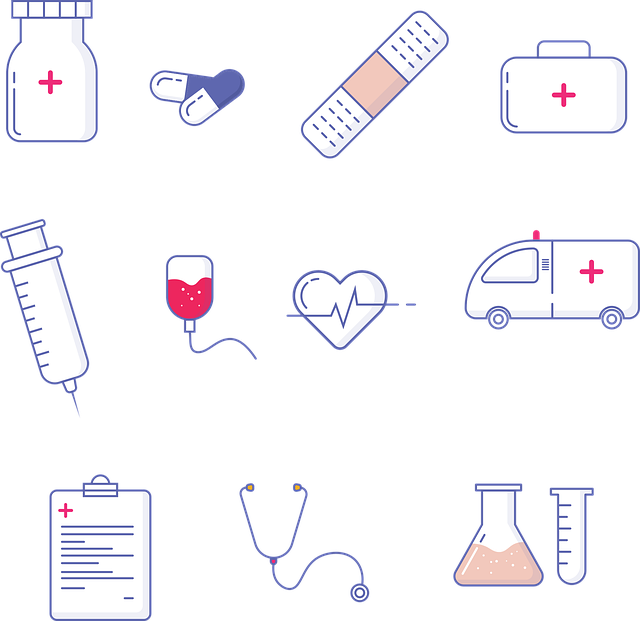Translation services for UK Public Health Reports are critical in ensuring that health information is accurately conveyed and culturally adapted for the country's diverse population. These specialized translation services go beyond mere language conversion; they incorporate cultural nuances to make public health communication resonate with different communities, thereby improving understanding, trust, and effectiveness of health interventions. In the UK, where legal standards such as GDPR and the NHS Act 2006 govern data protection and privacy, these translation services also ensure compliance with regulatory frameworks. They facilitate the integration of international research findings into UK public health strategy, thereby enhancing health outcomes and informing decision-making across various public health interventions and campaigns. The successful implementation of such translation services has been demonstrated in real-world scenarios, including a national health campaign and local pandemic response efforts, where they effectively communicated critical information to non-English speakers in a manner that was both linguistically precise and culturally sensitive.
Navigating the complexities of public health report submission, particularly within the UK’s unique regulatory landscape, is pivotal for effective data dissemination and informed policy-making. This article delves into the essential adaptation of global health reports to meet UK standards, emphasizing the critical role of professional translation services in this process. We explore key distinctions between international public health frameworks and their UK counterparts, legal and ethical reporting considerations, and the nuances of localising public health terminology accurately. With a focus on compliance with UK regulatory standards for health data, we underscore the significance of culturally sensitive translations to ensure clear and impactful communication. Further, we examine successful case studies that highlight the streamlined review and approval process facilitated by precise translations. For entities submitting public health reports in the UK, understanding these elements is not just an option but a necessity for meaningful engagement with the UK’s healthcare system and its diverse populations.
- Understanding the Necessity of UK-Specific Report Adaptation
- The Role of Professional Translation Services in Public Health Reports
- Key Differences Between Global and UK Public Health Frameworks
- Navigating Legal and Ethical Considerations in Public Health Reporting
- Identifying and Localising Relevant Public Health Terminology
- Ensuring Compliance with UK Regulatory Standards for Health Data
- The Importance of Culturally Sensitive Translations in Public Health Communication
- Streamlining the Review and Approval Process with Accurate Translations
- Case Studies: Successful Submission of Multilingual UK Public Health Reports
Understanding the Necessity of UK-Specific Report Adaptation

When it comes to public health reports, the context and regulatory framework within which they operate are critical to their acceptance and utility. For reports to be UK-ready for submission, they must align with the specific healthcare environment, policies, and practices of the United Kingdom. This alignment is not merely a matter of translation; it requires a nuanced understanding of the UK’s public health landscape. Translation services for UK Public Health Reports must transcend mere linguistic conversion. They should adapt findings to resonate with the UK’s healthcare priorities, considering the unique challenges and characteristics of its population. This includes factors such as the National Health Service (NHS) structure, local policies, cultural nuances, and existing health issues that are specific to the UK. A report that has been meticulously adapted for a UK audience stands a better chance of being informative, relevant, and actionable within the British public health sector. Utilising professional translation services that specialise in public health documentation is essential to bridge the gap between international research and local application, ensuring that the reports contribute meaningfully to the UK’s ongoing efforts to enhance the health and well-being of its population.
The Role of Professional Translation Services in Public Health Reports

In the realm of public health, the dissemination of accurate and timely information is paramount. As UK Public Health Reports often contain critical data and insights that inform policy, influence clinical practices, and guide community interventions, it is essential that these reports are accessible to a diverse audience within the UK. This is where professional translation services play an indispensable role. These services ensure that health information is accurately translated into the myriad of languages spoken across the nation, thereby breaking down linguistic barriers and facilitating a broader understanding of public health issues. The nuances of medical terminology and the subtleties of cultural context are critical factors that professional translators address to maintain the integrity of the reports. By providing translation services for UK Public Health Reports, these experts enable stakeholders, from healthcare professionals to patients and policymakers, to engage with information that is both precise and comprehensible, regardless of their language proficiency. This not only enhances public health engagement but also supports the UK’s commitment to inclusive communication within the healthcare sector.
The selection of a translation service provider for UK Public Health Reports should be approached with care, as the accuracy of the translation can significantly impact public health outcomes. It is imperative to choose translators who are not only proficient in the relevant languages but also possess a solid grasp of public health terminology and concepts. These translators undergo rigorous training to ensure their work aligns with the high standards required for official reports. Furthermore, they often work within specialized teams that may include subject matter experts, thus ensuring the translation is both technically sound and culturally appropriate. This collaborative approach ensures that UK Public Health Reports, once translated, retain their scientific integrity and can effectively inform and guide the public health strategy of the UK.
Key Differences Between Global and UK Public Health Frameworks

When preparing public health reports for submission in the UK, it is imperative to align with the nation’s specific frameworks and guidelines. Unlike global standards, which often encompass a diverse range of practices, the UK public health system operates within a structured set of regulations and ethical considerations. A key difference lies in the approach to evidence interpretation and data presentation; UK reports typically follow stringent guidelines for clarity, conciseness, and formatting, which may differ from international norms.
Translation services for UK Public Health Reports play a pivotal role in bridging this gap. These services are adept at converting global public health terminology and methodologies into the idiomatic and regulatory language required by UK authorities. This ensures that reports are not only accurately translated but also contextually appropriate, adhering to the specificities of the UK’s healthcare system, its governance, and its data reporting requirements.
By leveraging these translation services, researchers and institutions can navigate the nuances between global and UK public health frameworks effectively, thereby facilitating a seamless submission process and enhancing the credibility and impact of their findings within the UK context.
Navigating Legal and Ethical Considerations in Public Health Reporting

When preparing public health reports for submission in the UK, it is imperative to consider the legal and ethical frameworks that govern data handling and reporting. The UK’s legislative environment, including the General Data Protection Regulation (GDPR) and the UK’s Data Protection Act 2018, sets stringent guidelines on how personal data should be processed, stored, and shared. Report authors must ensure that all sensitive information is anonymised or handled in compliance with these regulations to protect individuals’ privacy and confidentiality. Additionally, ethical considerations such as informed consent, the potential for unintentional bias, and the accurate representation of data are crucial. To navigate these complexities successfully, utilising professional translation services for UK Public Health Reports is advisable. These services can help maintain the integrity of the report’s content, ensuring that it aligns with the ethical standards and legal requirements specific to the UK. They provide expertise in converting findings into a format that is both understandable to the target audience and compliant with local regulations, thereby facilitating effective communication and informed decision-making within public health policy and practice.
Identifying and Localising Relevant Public Health Terminology

When preparing public health reports for submission in the UK, it is imperative to ensure that all terminology used aligns with local healthcare vernacular. This is not merely a matter of semantics but a critical aspect of ensuring clarity and effectiveness in communication. The UK’s National Health Service (NHS) operates within its own framework of health-related terms and definitions, which can differ significantly from those used in other countries. To bridge this gap, it is essential to engage translation services specialising in UK Public Health Reports. These services are equipped with linguistic experts who possess a deep understanding of both the source and target languages as well as the specific medical and public health lexicon. They meticulously identify and localise terminology, ensuring that all reports are semantically accurate, culturally relevant, and compliant with UK standards. This process involves not only direct translations but also contextual adaptations to guarantee that the intended meaning is conveyed accurately, facilitating informed decision-making by UK health authorities. By leveraging these translation services, organisations can enhance the quality of their reports and increase their chances of successful submission and acceptance within the UK public health domain.
Ensuring Compliance with UK Regulatory Standards for Health Data

When preparing public health reports for submission in the UK, it is imperative to adhere strictly to the country’s regulatory standards for health data. These standards are not merely a formality but are critical for the acceptance and utility of the reports. The UK’s stringent data protection laws, such as the General Data Protection Regulation (GDPR) and the National Health Service (NHS) Act 2006, necessitate that all health-related information is handled with the utmost care and confidentiality. Translation services for UK Public Health Reports must be well-versed in these regulations to ensure that all data is accurately translated and remains compliant throughout the process. This involves not only converting text from one language to another but also ensuring that the context, cultural nuances, and legal requirements are preserved. The translation should reflect the original report’s intent while aligning with UK standards for terminology and presentation, which may differ from those in other countries. By leveraging specialist translation services that understand these specific demands, public health entities can confidently submit reports that are not only linguistically accurate but also fully compliant with UK regulatory requirements. This mitigates the risk of legal or ethical issues that could arise from non-compliance, ensuring that the valuable insights within these reports can effectively inform public health strategy and policy in the UK.
The Importance of Culturally Sensitive Translations in Public Health Communication

When disseminating public health information, particularly through translations for UK audiences, cultural sensitivity plays a pivotal role in ensuring effective communication and understanding. The translation services for UK Public Health Reports must transcend mere linguistic accuracy; they must also resonate with the cultural context of the UK population. This is because public health messages often pertain to sensitive topics such as healthcare practices, lifestyle choices, and personal behaviors that are deeply influenced by cultural norms. A nuanced translation acknowledges these influences and adapts content to align with local idioms, values, and societal expectations. This adaptation not only facilitates clearer comprehension but also fosters trust and credibility in the messaging, which is paramount for public health interventions.
In the UK, where a diverse range of ethnic groups coexist, the importance of tailoring translation services for UK Public Health Reports cannot be overstated. A one-size-fits-all approach is insufficient; instead, translators must employ culturally informed strategies that account for linguistic diversity and social dynamics. This level of customization ensures that public health information reaches all communities within the UK with clarity and cultural relevance. It also enables healthcare providers and policymakers to address disparities in health outcomes by providing accessible, pertinent, and actionable information to every segment of the population, thus promoting equity and informed decision-making across the board.
Streamlining the Review and Approval Process with Accurate Translations

Ensuring that public health reports are accurately translated and aligned with UK standards is a critical step for their submission within the healthcare sector of the United Kingdom. The review and approval process can be streamlined significantly by utilising professional translation services specifically designed for UK Public Health Reports. These services not only convert content from one language to another but also adapt the terminology and phrasing to comply with the nuanced regulatory requirements of the UK. This adaptation is essential, as direct translations may not capture the precise medical and public health context that UK stakeholders expect. By leveraging experts in both translation and public health, these services ensure that all reports are not only linguistically correct but also reflect the UK’s specific guidelines and standards, thereby facilitating a smoother and more efficient approval process.
Incorporating detailed knowledge of both language and domain-specific terminology, translation services for UK Public Health Reports provide a reliable means to communicate research findings, health recommendations, and policy changes to UK audiences without compromising on accuracy or clarity. This is particularly important when the information is to be used in decision-making processes that impact public health interventions and strategies. By removing potential barriers related to language and cultural nuances, these services ensure that international research and best practices can be effectively integrated into the UK’s public health framework, ultimately contributing to the delivery of better health outcomes for the population.
Case Studies: Successful Submission of Multilingual UK Public Health Reports

Ensuring that public health reports are accurately and effectively communicated in a multilingual context is paramount for inclusive and comprehensive healthcare strategies within the UK. The successful submission of these reports hinges on the reliability of translation services specifically designed for UK Public Health Reports. For instance, a recent case study highlights the seamless integration of professional translation services during a national public health campaign targeting ethnic minority communities. The campaign’s materials were translated into multiple languages, ensuring clear and precise communication across diverse linguistic groups. This initiative not only broadened the reach of the health messages but also adhered to legal requirements for accessibility and inclusivity. Another successful case involved a local authority that leveraged expert translation services to convey critical public health information to non-English speaking residents during a pandemic. The translations were not only linguistically accurate but also culturally sensitive, ensuring the messages were received as intended. These examples underscore the importance of utilizing high-quality translation services for UK Public Health Reports to effectively engage with all segments of the population, thereby enhancing public health outcomes and compliance with regulatory standards.
In conclusion, maintaining the integrity and accessibility of public health reports within the UK’s unique framework is paramount. The adaptation process for these documents must extend beyond mere translation; it requires a deep understanding of local contexts, regulatory standards, and cultural nuances. Utilising professional translation services for UK Public Health Reports is not just a procedural necessity but a critical component in ensuring that global research findings are both accurate and actionable within the UK’s healthcare systems. By carefully addressing key differences between international and UK public health frameworks, navigating legal and ethical considerations, and identifying and localising relevant terminology, these reports can effectively contribute to informed decision-making and improved public health outcomes. The case studies presented demonstrate that with diligent attention to detail and a commitment to compliance, multilingual UK public health reports can be successfully submitted, thereby enhancing the global understanding of health issues. It is through such meticulous efforts that these vital communications become not only UK-ready but also a testament to the universal goal of safeguarding and promoting health for all populations.
